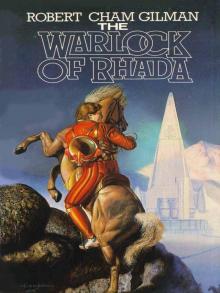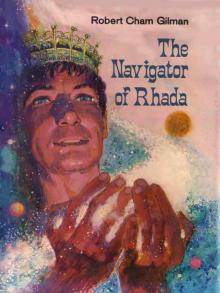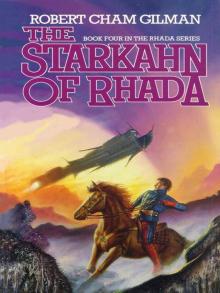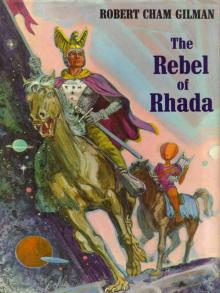- Home
- Robert Cham Gilman
The Warlock of Rhada Page 2
The Warlock of Rhada Read online
Page 2
The Warlock, so-called by the ignorant folk, stood on the ferroconcrete tunnel-mouth of the hospital and stared with blind eyes at the valley of Trama. He was facing south, across the lower couloir of the unnamed glacier that had, for two thousand years, gradually receded, leaving a pebbled moraine and a half dozen icy, leaping rivulets that plunged into the valley to feed the more slowly moving river.
He could not remember clearly when he had come to the hospital. The weather had been warmer then, and the glacier had been high above the entrance to the deep caverns and halls and wards. He was almost certain that the hospital had been completely alive, thronged with star-class patients. Cyborgs had been everywhere, attending to the last needs of the soon-to-be Sleepers. His memories were indistinct because drugs did damage the brain, and so did the Sleep, if it lasted too long. And no one knew exactly how long was too long. No matter. He had been blinded by trilaudid and on the way to death when Dihanna insisted that he take the Sleep.
Dihanna! The name evoked a surge of emotion, a terrible longing, a thrill of pleasure. He remembered sailing his goldenwing--a spaceship made like a jewel and driven by the pressure of light on golden foil sails a thousand meters tall--with Dihanna by his side. He saw again the Jovian moons in the dark sky and heard the sound of Dihanna singing and playing the synchromion so that the ghostly melodies filled the fragile hull with the music of the spheres.
How beautiful was Dihanna--the Right Honorable Lady Dihanna alt Aldrin, royal cousin of the Rigellian Emperor, Patroness of the lands of High Canopus, Mistress of Vega-even now, her titles rolled easily off his tongue and, Great Star!, he could not remember his own name--could not remember his own name.
Tears formed in his blind eye sockets.
How long had he been here?
The glacier--it had moved from the place he remembered in the high ravine, and it had at some time covered the entire slope of the mountain down to far below the present tree-line. It had left the moraine as evidence. And then it had receded, and the feathery conifers had grown again, and the cyborgs had left the hospital, and the folk of the plain had lived and died and had been driven, generations ago, back into these meadowed valleys. The bulky instrument implanted in his left shoulder hummed and whispered and translated the light and shadow of Vyka’s day into impulses his brain could accept as sight. It “saw” the weyr herds grazing, the thin smoke rising from the peasant hovels near the river.
These people knew almost nothing of the Empire, of the Rigellian Galactons, of the provinces and cities and worlds without number that he (whom they called the Warlock) knew.
So long, then?
Time enough for the very galaxy to change, to become empty, for a civilization of peasants and herdsmen in animal skins to take over.
He frowned, trying to remember. There had been civil war on the Rim when he took his leave of Dihanna. And racial troubles in her lands of High Canopus. She had said, “I will wait a year. If they cannot give you back your eyes, I will join you and wait with you in Sleep.” Yes, he was almost certain she had said that. He remembered it; they had been standing on the great promenade of the Starship Delos, surrounded by the thronging, brilliantly dressed passengers for the Outer Provinces, and the orchestra had been playing and below,
Nyor, Queen City of the Stars, a blanket of gems in the velvet night of Earth--
“Earth,” he said aloud, grieving. “Earth, Dihanna--”
The memories (or were they fantasies of a sick mind?) drifted. Dihanna had never come. No one had come to wake him. His entourage had been a glittering multitude, and now they were all gone. There was only the silent hospital and the tranquil valley and the vast emptiness of this world of mountains and forests and distant plains.
Dihanna is dead. Dihanna is dust. Somehow, he knew that was true. Great Star, the time that must have passed! For he was old.
He knew that the cold Sleep did not kill. It slowed the body processes almost to the point of cessation. A man might sleep for two hundred years and age no more than a few days. Yet he was old. He could see the old man’s hands when he held them before the lenses of his “eye”--the skin dry and fusty, the veins blue and knotted, the fingers frail and twisted. He had been a young man when he boarded the Delos, a prince. The Patroness of High Canopus, a cousin of the Rigellian ruler of the Empire, would know no other sort of man--
Yet, had she finally known one? A civil war in the Rim-worlds was a small thing in an Empire of a hundred thousand star systems. Yet had Dihanna--and all those other glittering folk of Nyor--in the end known some dark barbarian soldier, an atom-blast in his hand, scything down the ancient order of things?
Oh, Dihanna--yes, she was dead. Nyor was dust. There was no Empire. There were only the mountains and the simple folk of the valley they called Trama, the empty sky and the alien star standing now near the zenith of a pale and greenish sky.
He stirred and his metal-mesh hospital gown rustled. The gown fed him, warmed him, probably protected him, as well. He had not yet had cause to know. For lack of anything better to do he had trained the wild eagles of the valley to hunt for the valley folk who, disgustingly, ate meat--red and bloody. For a half-year, through a change in the season, he had roamed the hospital. At first, he had searched for other Sleepers. Then he had called for a cyborg to come and serve him. But there were neither Sleepers nor cyborgs. And there was a fine dust on the gleaming floors, the dust of millennia, his sick mind told him. Somehow, he had been missed or left behind when the hospital had been evacuated--how long ago? And why? Had the civil war they had discounted so laughingly that night on the decks of the great Delos come plunging through this place with all its barbarian horror? He thought not. There was no destruction. The library was intact. The pile continued to supply power and light and heat. No, the medics and the cyborgs and the Sleepers had gone away. In some haste, he saw signs of that. Those civilized doctors and those magnificently made cyborgs had fled in panic from whatever savagery had descended on the complacent, corrupt, and glittering Empire that had lasted--in his own time--for five thousand years.
The folk of the valley, who sometimes worshiped him as a god, sang the chants of their dark past. The Warls, they called them: the prayers concocted by witches and warlocks to protect them from the fury their ancestors remembered. In the grieving laments and sagas of racial memory lay the dark tale of an Empire (a Golden Age, they said--well, it was not quite that) shattered, collapsing, sinking to barbarism.
From the rage of the star-raiders,
Save us!
From the fire in the sky,
Protect us, O Warlocks!
And now the snow had come and gone three times, and he still remained in the abandoned hospital, not knowing what else to do. He queried the computer, but the machine knew nothing of time. He radio-searched the hyperlight commo bands, and there was no human sound. If the great starships still flew, as the primitive folk of Trama claimed they did, they were mute. Whoever piloted the ships understood their systems poorly, if at all.
Often, the suspicion that nowhere in all the galaxy was there anyone like him left alive drove him to the brink of lunacy and suicide. But he lived on, for he had been a brave man and courage remained.
He would have occasional fits of kindness toward the dull folk of the valley. Like a mad Prometheus, he would give them useful knowledge: the mill in the valley was his innovation, he cured sick children capriciously, ranted history and Imperial protocol into their frightened faces. He taught the youngest daughter of the village chief to tame the eagles when he found she had a gift for the mental disciplines. He remembered, vaguely, lessons in mind-touch from the eyeless race of Vulk--but when and where and, always, how long ago? In a great palace, he thought, in some dark place where a single great moon lit the night, shimmering like silver on the tide of two great, placid rivers. A thousand years ago? Two thousand? Ten?
A short time ago, the hetman and the elders had climbed the moraine, bringing sacrifices of horrible red meat, per
forming unspeakable rituals. The lord of the nation in which the valley lay, they said, would soon send soldiers to punish them for withholding tribute, and they begged for help. They were like the lower classes always, the Warlock thought disdainfully, unwilling to fulfill their obligations to those set above them. (Had he heard that plaint before? He seemed to listen to an echo of similar words spoken in a great hall by a supercilious man seated on the Star Throne. Was it someone called Rigell? Was it the Galacton? But the Galacton was dust--as Dihanna was dust. The memory vanished like mist in cold sunlight.)
The skin-wearing savages of the valley disgusted him. He sent them away. What could a blind old lunatic who imagined he belonged in another time do if armed men came into these mountains? What did he want to do? The hetman did not speak of civilized men, but of barbarians in armor. He felt bleak and abandoned. Dihanna had not come as she promised. No, she had met instead men in steel corselets and armed with the starlight--a thousand years ago, ten thousand years ago--
A dark hatred rose in him like a bilious tide. His old hands trembled with rage. Let them come into the valley at their peril. There were instruments in the hospital, instruments meant as healing tools, but he would be less than a man of the Empire if he could not transform such things into weapons to terrify and destroy barbarians.
With his eye humming and clicking as it changed focus, he turned and walked back into the dimness of the tunnel beneath the mountain. The drug-hunger was upon him, and he shuffled swiftly toward his sleep-tank, feeling the preliminary gentle probing of the million microscopic needles in his living, silvery robe.
Chapter Three
--of the various diversions available to travelers in the Province of Vega. Certain of the eagles of Aldrin have been bred as receptors, and thus the adept may, with mental amplification, become one of Aldrin’s eagles for a time, hunting and actually shedding blood. “Eagle-riding” is fast becoming a popular sport among the wealthiest of our Rigellian nobles.
Aldrin’s other inducement, of course, is the widely known Cryonic Suspension Center, where presently incurably ill patients may await--
--Golden Age fragment discovered at Aurora,
Middle Second Stellar Empire period
With my companion Warman Oelric of the Foragers, I was riding on the northern bank of the Foaming River at a distance of some fifteen kilometers from my Lord Ulm’s Black Keep on the river delta, and it came to pass in that time and place that we were attacked by three great birds. Of weight they were more than one hundred kilos each, and of span, fully eight meters, and each pinion was armed with great claws as were their feet. It was these birds, in the service of Sin and Cyb, who murdered my companion Oelric of the Foragers, and not I, as God in the Star is my witness.
--From the Vykan Archive, a statement made by an unknown warman of the garrison on the Archery Field, where he was put to death.
Late Interregnal or Early Second Stellar Empire period
Shana, the daughter of Shevil Lar the hetman, known as Shana the Dark, crouched on her haunches and watched the savage birds who had formed a circle around her. She had been repeatedly warned by the Warlock and by her father to avoid disturbing any convocation of the eagles, and in truth the creatures were in a savage mood at this moment, billing one another and eyeing the girl with eyes of metallic rancor. But with the pride of the adept, she had climbed the cliff to the aerie when she saw the birds gathering, certain that they would tolerate her presence. Now she was not so sure: the cruel bird thoughts plucked and snatched at her human brain angrily. She had never known the birds to be so hostile, even in their time of molt.
The master bird spread his wings and screeched defiance first at the invaders of the valley, then at the weyrherds in the meadows below, and finally at Shana. Though the words were not in any sense human, he was saying that Shana was as much an intruder as the strangers and that the flock must now return to its ancient ways. “You cannot any longer compel us. We will kill as we choose.” The alien thoughts tumbled through Shana’s mind in a sickening torrent of the blood of weyr and the torn flesh of men. Shana shivered, and one of the birds nearest her in the convocation circle struck at her with his razor-sharp bill, opening a small cut on her naked arm. She reacted instantly, striking back, her small fist banging feebly against the eagle’s armored throat. But with the blow she hurled the mental key, the simple thought-pattern taught her by the Warlock, that could inflict pain on the birds. All in the circled squawked and danced, and the individual against whom Shana had loosed the discipline gagged and gasped and struggled for balance. Instantly, the birds nearest him began to strike at him until his iridescent feathers were spattered with brownish blood.
“Stop,” Shana said. “Enough.”
The circle subsided into guttural angry duckings and squawkings. The lidless, non-human eyes fixed themselves on the girl with such coldness that she gathered her skin skirt over her thighs and shivered. But she persisted. “I am the Falconer,” she said aloud, repeating the ancient ritual the terrifying old man in the mountain had taught to her. “You have been bred to obey me.”
This was untrue. The birds were native to this place. They had been here long before Shana’s people came to the valley. But the Warlock said that these were the magical phrases, and that the birds learned the ritual as nestlings, and even before. It was part of something he called their “genetic code,” and when an adept such as Shana said them, the birds must listen and obey. “To do otherwise would be like a man willing his heart to stop beating,” he had said.
But Shana’s control was not as firm as she had imagined down in the safety of the valley. Up here on the cliff it seemed to her that the vicious creatures might break free of her domination at any moment. She was bitterly afraid and sorry that she had been so brash as to intrude herself into the convocation of eagles.
She said, “Who are the strangers?”
The birds fluttered and danced and said that they did not know. Nor did they care, Shana knew. They were men. And they were men not covered by the taboo she, with the Warlock’s help, had put upon the eagles against killing the men of Trama. Yet she suspected that if the eagles began by attacking the strangers, who must be Lord Ulm’s soldiers, they would end by breaking the prohibition and savaging the people of the valley and their flocks of helpless, grass-eating weyr.
Shana could not imagine a slaughter of men, for she was sixteen seasons old and had never seen men killed. But as a weyrherd, she could visualize the slaughtered flocks and this was real to her: real and terrifying.
The hot sunlight of Vyka burned down on the bone-littered rock shelf where the aerie overlooked a patch of meadow and a bend in the river. Shana was sweating. She wiped her damp palms on her small breasts and closed her eyes, trying to see through the eyes of the eagles. The birds’ thought patterns were frightening and chaotic; the Warlock had explained to her (impatiently, testily) that they only seemed so because they were not human. Through the clutter of images came a bird-memory of the strangers, seen from high above. A line of shining men. Armor, Shana thought, as the eagles see it. Well, there was no doubt that the intruders were warmen; the village elders had been expecting them, this full season past. But there was a brown man with the soldiers, brown with loose, coarse skin. The habit of a priest-Navigator, Shana thought with sudden panic. She and the folk of the valley feared the clergy and the Red Fist of the Inquisition even more than they feared the Adversaries, Sin and Cyb.
Her fear confused the mental discipline and she lost the images. Her mind retreated through the cacophony of blood and hunger and shrieking cries that customarily filled the tiny minds of the great birds. As she mentally fled, she recognized the eagles’ resentment of her--the puny human creature who forced them to hunt only outside the confines of their valley.
She came to her knees and bits of bone and rock cut into her naked shins. She straightened so that she knelt among the great birds, her eyes on a level with theirs. Suddenly she raised her arms, hands spread,
in a grotesque parody of a bird taking flight. She gave them the command: “Go! Fly! Keep watch!”
The convocation erupted into angry screaming, for the eagles had no wish to obey her, but she was the adept and they unwillingly stretched, stirring the bones and dry leaves and twigs that littered the rock as their great clawed pinions beat the air and they lifted from the aerie to soar on the currents rising along the cliff from the valley below. The rock-face seemed to erupt with birds and their shrill cries echoed across the meadows and the river.
Trembling, her breath coming in short, shallow gasps, Shana stumbled down the narrow ledges toward the land below. There was blood on her brown arms and legs and her bare feet burned on the hot rocks, but she did not pause as she ran to give the folk warning of the thing the eagles had seen. And as she ran, her adept’s mind felt still another thing, a strong pulse of mental power coming at her from the southern ridge. She reviewed the eagle-images and became aware of a thing she had missed on first probing. One of the tiny men rode with the Lord Ulm’s warmen. She did not know what this might mean, but the strong brain-waves were upsetting the birds, setting their cramped minds at odds and making them behave irrationally.
Her fear grew stronger and her naked feet burned on the sun-heated rocks. Shevil would know what must be done. She ran on, dark hair streaming and thick terror in her heart.
Chapter Four
Fear the Vulk, for he sees without eyes and knows the Black Arts and dreams of the blood of children. He is not as men are.
--From The Vulk Protocols,
authorship unknown, Interregnal period
How little we really know of the Vulk. We believe that he lives long, that he touches minds, that he loves men. We do not know how long, or if he really knows our thoughts, or why he should love us. Of this alone we are certain: in ten thousand years of star-voyaging, only the Vulk have we found sharing our eternity.

 The Warlock of Rhada
The Warlock of Rhada The Navigator of Rhada
The Navigator of Rhada The Starkahn of Rhada
The Starkahn of Rhada The Rebel of Rhada
The Rebel of Rhada